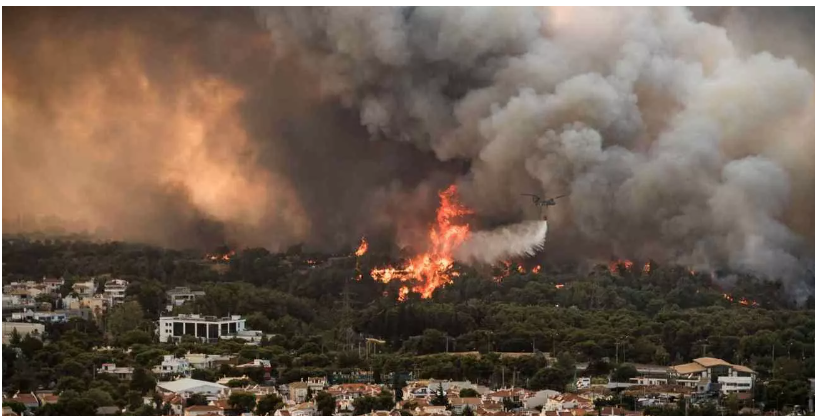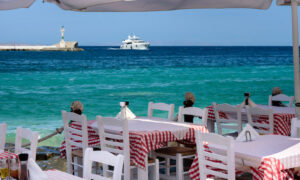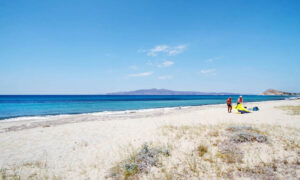(Editor’s note: This is Pt. 1 of a two-part series about the fires in Greece. You can jump to Pt. 2 here.)
As a woman in her late forties who has spent the majority of her life in Greece, I can remember a time when a big forest fire was a rare and shocking event. In the past decade, however, ashy orange skies and the smell of acrid smoke have become all too common.
I know countless people who have been directly affected by the wildfires in Greece of recent years. I have friends whose homes and neighborhoods have been severely damaged, I know children who have suffered asthmatic episodes due to smoke and particle inhalation, I have talked with folks who have had to cancel their long-dreamed of Greek vacations and I have mourned beloved green hiking areas which have been turned into infernal wastelands.
I have talked with recent expats in Athens who have been very much taken aback by the fires of late, as they hadn’t realized that many of Greece’s fires also threaten homes, not just isolated forested areas.
Another summer of destruction
This summer, the trend of deforestation has sadly continued, with huge forests reduced to ashes and countless insects, birds and forest animals being burnt or left without their natural habitats.
Houses and resorts have gone up in flames and nearly two dozen people (including two honorable air force pilots) have been killed while trying to escape or fight the fires. Record numbers of people have had to be evacuated, including many tourists on the island of Rhodes earlier this summer and around the city of Volos a few weeks ago.
Last week, we had a terrible fire on Mount Parnitha, one of the pitifully few “lungs” of Athens, which was also severely damaged by a different blaze just two summers ago. A wildfire started near the city Alexandroupolis in northeastern Greece two weeks ago and threatened surrounding villages and the city itself. It then spread far and wide, ravaging beautiful national parks and other important ecosystems.
Massive areas are still burning as I write, 14 full days after the flames began. This particular inferno is said to be the largest fire in the European Union since authorities keeping official records in 2000.
Few of us can forget the images of newborns and other vulnerable patients rescued from a central hospital in Alexandroupoli, lying on the floors of a ferryboat, having been evacuated from the city on this bizarre, floating, makeshift hospital.
The Greek public is angry
People are understandably upset. They are asking why Greek wildfires statistically burn longer and farther than their counterparts in other areas, including in countries with similar climates? They want to know why our authorities do not place much emphasis on preventative measures; why we have fewer firefighters than we need and why every summer we seem to be caught off guard and time-sensitive responses can take hours or even days to begin?
We all want to know why during many fires there is a call for food and bottled water for the firefighters. Last summer, when fires raged on Penteli Mountain (including in the northern suburbs of Athens) local Boy Scout troops dedicated hours to making sandwiches to feed those who risk their lives to save people and our precious natural environments.
Why were there no provisions?
Why are we still putting on superfluous air shows every September in Tanagra Air Force Base when every July and August we hear that we don’t have enough firefighting planes to put out the flames?
Athens struggles to cope with a changing climate
In recent years, Greek winters have become increasingly mild and summers increasingly hot (heat dome hell!), so water supplies are way down and fires catch and spread more easily than they used to due to the longer, hotter heat waves, strong dry winds and reduced soil moisture. However, there are also other issues at play. Countries with similar climates (and climate change phenomena) also have blazes, but those are often put out more quickly and efficiently, with much less overall damage.
Our firefighting response is problematic, as is the fact that we are emphasizing land management and fire prevention less than ever while these things are actually more important than ever.
Environmentalists heavily criticize budget cuts to protective measures, a reduction in the numbers of firefighters and an overall change in how we confront the problem. A huge emphasis appears to have been placed on very proactively evacuating inhabited areas which are anywhere near blazes. This is of course positive, but evacuees say that once they are out, efforts to fight the blaze often cease (if they had even started, which isn’t always the case) and that is why some residents risk their lives against official advice in order to stay and attempt to save their homes or businesses.
Fire risk and house hunting
“Prevention is better than cure” is the conventional saying which we seem to have forgotten. It is much easier to prevent a fire than to extinguish one, yet past and present governments have been accused of reducing the funding for preventative measures, as mentioned above. This has led to some groups accusing public and private interests of either purposely setting fires and/or allowing them to burn unhindered in order to develop the land for residential communities or tourist resorts.
Laws governing what can’t and can’t be done in natural environments as well as in burnt areas have been loosened. Some say the casual official attitudes towards fires might be to add to the ever-growing areas given over to wind farms, since burnt land is easier and cheaper to prepare for the placement of turbines.
Whatever the reason(s), people (including expats) are starting to choose where they live only after having taken into careful consideration their fire risk, fire insurance matters and so on.
In February, I wrote a two-part series on my experiences, “House Hunting in Athens.” One thing I didn’t mention was that one of the first apartments we really liked was perfect for my family in terms of size, location and layout. However, after a lot of thought, we decided to pass on it because it bordered a very large pine tree park containing hundreds of beautiful green pine. What would ordinarily be a huge selling point, especially for an apartment in the “concrete jungle” of Athens, is now actually a liability for that owner who has now been trying to sell for over two years without success.
Our agent had even prepared for our qualms upon the first viewing, presenting all kinds of sprinkler and insurance solutions we could employ to reduce the risk and the consequences. When we first looked at the apartment, it was only a few months after the aforementioned Penteli Mountain fires of last summer during which the flames had reached an area a mere six streets away, just at the foothills of the mountain. With the memories of the fires so recent in our minds, we regretfully had to pass on the lovely apartment.
It’s a strange time when gorgeous trees can bring more stress than joy.
––––––––––
The extent of the problem can be explored here.
For locating active fires and previously-burnt areas, Copernicus is an invaluable resource.
Read more about Greece here in Dispatches’ archives.
Read more from Christina here.
A Pittsburgher by birth, Christina T. Hudson is also half Greek and has – so far – spent most of her life in Athens, the chaotic but captivating capital city of Greece.















